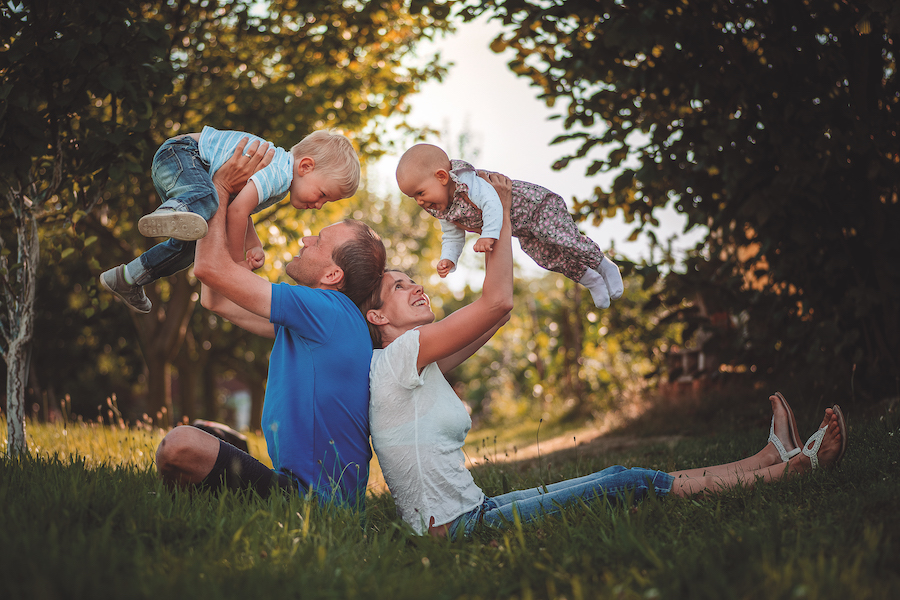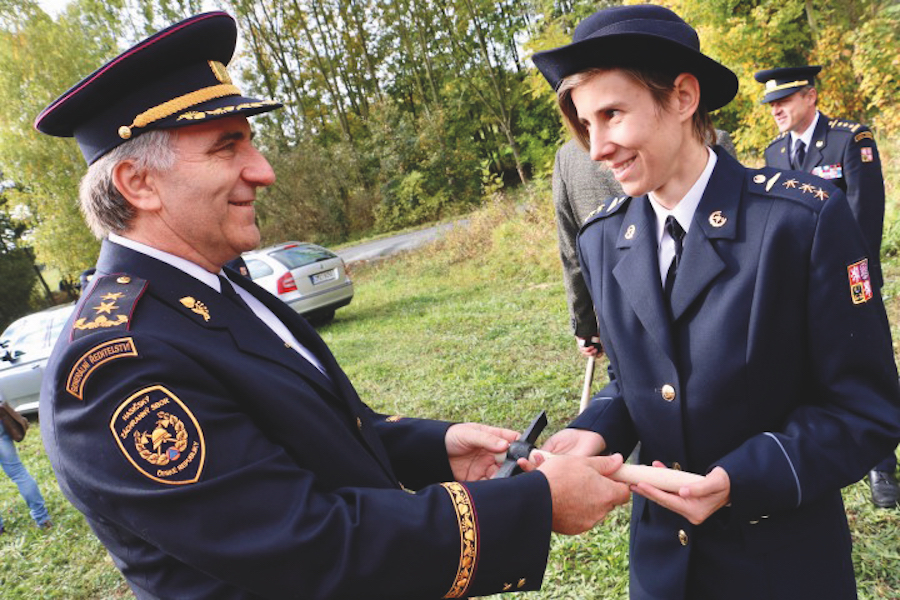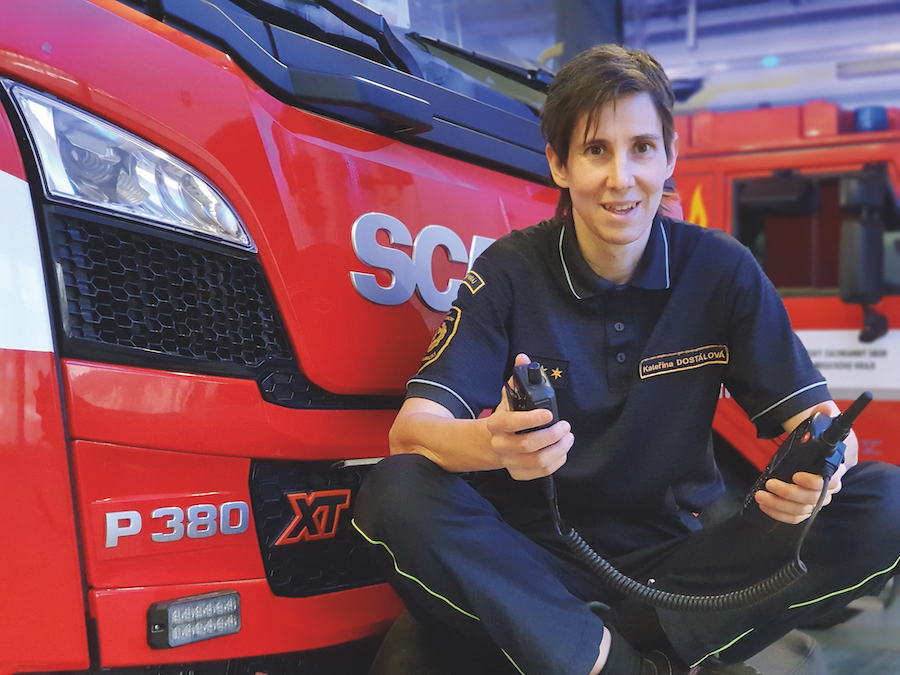“I must do the SAME WORK AS MEN, but I do it DIFFERENTLY”

Kateřina Dostálová, Chief of the Fire Service Station
Let us introduce Lt. Ing. Kateřina Dostálová. She is in command of the fire service station Konice in the Olomouc region. She graduated from the VSB Technical University of Ostrava, receiving her degree in Fire Protection Engineering and Industrial Safety and since 2007, she has been active in the Fire Rescue Service of the Olomouc region. Kateřina Dostálová is married and has two little children. In her free time, she ejoyes spending time with her family and being physically active. What exactly are the responsibilities of the fire service station chief? What should we focus on in regards to fire prevention? And how does the pandemic influence the life-work balance of someone in her position?
What is it like to be a woman in a man ́s world in your profession? Can you tell us more about your station?
I work as the chief of a small station with 15 firefighters who take turns doing three 24-hour shifts. There is always a commander, his deputy – a technician, two engineers, and a firefighter on each shift. The crew responds to all types of incidents: fires, car accidents, the rescue of persons and animals, and we also provide technical assistance. Simply said, our activities include everything from extinguishing a family house fire, securing a crashed car, removing a fallen tree from the road, capturing dangerous insects, helping emergency medical services load a patient, to, let’s say, taking a kitten down from a tree.
When I started working here, I was 27, had three years of work experience at the operations center, and was the youngest (in the station). This would be a hard start even for a big man, let alone a girl who is 170cm tall and weighs just a little over 50kg. I clearly understood that I cannot compete with men in regards to neither strength nor experience I had to go about it differently, using the knowledge, diligence, flexibility, and cleverness of my small hands. And I had to learn a lot. It was not easy; it was hard work, and I surely made a lot of mistakes. But now, eleven years later, I am still here, with 15 men under my command. Having supportive and trusting superiors was a great advantage too.
Getting accepted by my colleagues, chiefs of stations themselves, and other daytime shift members of the fire service who I collaborate with was a bit easier (to achieve). We all do the same work; we all must get it done well and we all need the same skills. However, I still remain a bit of a curiosity for others.

You are a mother of two small children, and have spent six months on maternity leave. Balancing work and family life during the pandemic represents a major challenge for all working women, who manage taking care of their quarantined children and working from home at the same time. But I can ́t imagine balancing things while working at the fire station…
When I returned to work after my maternity leave, my children were seven months old. There is a specific employment law that addresses returning to work after maternity leave for members of the security services.
I was allowed to work part-time. First, it was ten hours per week, and now I work approximately “half”-time. My superior and I always discuss what needs to be done and when, and then I adjust my work schedule accordingly. We do our best to help each other. Sometimes, I supplement the shift, which means it is not clear when I would get to go home. And even when I do get home, the phones keep ringing anyway and sometimes emails would come in which I have to take care of immediately. The things that my colleagues do while working full-time I have to do in a much shorter time, and just by myself most of the time. Sometimes, a colleague might help me, but there are moments when it is really hard to handle everything.

Lieutenant General Drahoslav Ryba, previous director general of Fire Rescue Service of the Czech Republic with Kateřina Dostálová at the ceremonial tapping of the foundation stone of a new fire station in Konice. On the back right Col. Petr Ošlejšek, Deputy Director General.
I would not be able to carry on through all this workload without my parents ́ help. They have already retired and are of great help with babysitting and educating our children. They pick up our older son from kindergarten and when we need it, they spend the whole day with our younger daughter or both kids. Our children really love their grandparents because they teach them different skills than we, their parents, do. I know that the children are in good hands, but for me not being with them is hard anyway. It makes coming back home even more pleasant.
What exactly does your shift look like? We all know the TV and film fire station “reality” where the crew are reading or playing cards and then quickly slide down and get to the fire, which they manage to miraculously tame in just a few minutes…
TV series and films show a very distorted image. Firefighters have a set daily schedule, which they obey. They hand over equipment, carry out repair and maintenance of the equipment and gear, and they are responsible for the maintenance of the facility. Add to that physical, and above all professional, training for which we have about five hours every shift. Firefighters intervene at various types of incidents, and it is necessary to be actively prepared for all of them. They must learn tactical procedures, hazard parameters, how to operate devices in vehicles in short, everything that is necessary to manage a safe call. Not every intervention is managed immediately, not every one of them is simple, and most do not have much in common with the romantic images delivered to you on TV. My daily schedule as a chief of the station is considerably different from the one of deployed firefighters. Most of the day I dedicate to paperwork connected to planning the shifts, training, professional education, preparation of payroll documents, solving possible problems with equipment and material, and administration related to management of the facility. I also communicate with municipalities and various private subjects. I participate in the professional education of firefighters and occasionally give training to volunteer firefighters. I take part in activities organized by the territorial district or region. I should not forget to mention self-study since I occasionally substitute the deployed shift, I must know everything that my colleagues do. Some days, I spend all my time solely in the office. Other days, I am gone elsewhere. My work duties are diverse and that is exactly what I like about my profession.
In regards to fires, prevention is vitally important. And here, new technology can help a lot. What should people be focusing on?
Today, there are many means of protecting buildings from fire. We have smoke alarms, automatic sensors on gas stoves, detectors for carbon monoxide in the air, we odorize gas… The goal is to improve our security. We think about fire escape routes and non-combustible materials. But we must not forget our own judgment and responsibility do not put flammable items near the fireplace, do not leave the iron on… In cars, we have a lane departure assist, proximity sensors, ABS, ESP, etc. However, if a reckless, irresponsible driver is involved, then all the top-notch safety technology becomes pointless.
The pandemic made us all realize the importance of our critical infrastructure functioning well. What else should the public know about your work?
Here, in the Olomouc region, it began with bringing the citizens of the Czech Republic back home from other countries. In cooperation with the police we were guarding the closures at Litovel area, distributing face masks and respirators, helping hospitals take care of the patients and increasing capacity of COVID wards, and we were also helping with the construction of the test and vaccination centers. Some of our activities connected to the pandemic are still going on. Our station is still taking part in the distribution of face masks, respirators, and tests for schools, and we are helping with the construction of a testing center. We perform standard activities under the increased hygienic measures. We work under a stricter shift occupation scheme. We get tested on a regular basis. We must do everything to diminish the risk of infection among our members. We cannot close the station and put a “closed due to illness” sign on the door.

What are you most looking forward to this year?
As far as my private life is concerned, I am really looking forward to all the activities with my children and family. I like taking walks in nature, showing my children around their neighbourhood, and helping them learn how to ride their bikes, ride their walking bikes, and do in-line skating. We are planning to add some more playground equipment for the kids outside our house. We have planned some trips. I am looking forward to each smile they make, to each hug I get.
Workwise, I hope that COVID restrictions will be relaxed and everything gets back to normal, at least a little bit. I am looking forward to the training and seminars that I will be able to attend. And I already miss even the standard meetings where we exchange experience among colleagues. I hope we will finally be able to meet in person, not only online.
Text: Linda Štucbartová; Photo: Fire department archive

